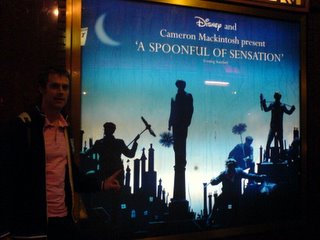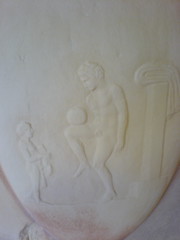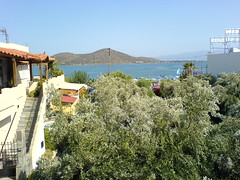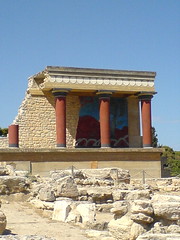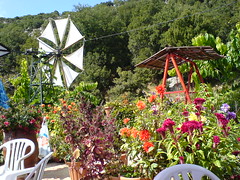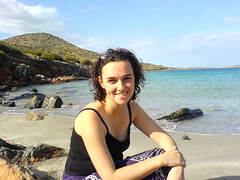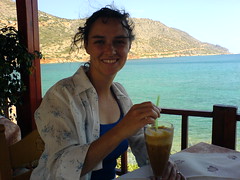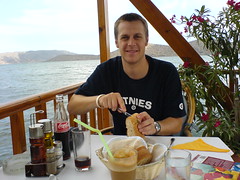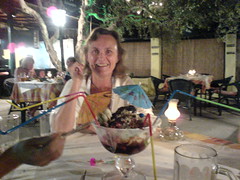Muslim Suicide Bombers?
In light of recent events and the ongoing
debate surrounding Islam within Britain, I am posting an essay which I wrote last year on the question of whether those who commit such acts can be considered to be acting in accordance with Islam.
Introduction
The events of September 11th 2001 caused many in the West to ask questions about the religion of the perpetrators. The hijackers, as their suicide notes show, believed they were acting as true Muslims, playing their part as martyrs in a ‘holy war’, dying ‘in the way of God’. Both George Bush and Tony Blair were quick to state that whoever was responsible had perverted the teachings of Islam which is a ‘peace loving religion’.
1 This essay will attempt to answer the question – ‘to what extent can the men and women who commit suicide attacks be considered to be acting in accordance with the Islamic religion?’. The question will be approached in four parts – firstly, a brief overview of martyrdom within Islamic history will be given; secondly, the views of the some of the people who perform these acts will be explored, thirdly, some texts from the Qur’an will be examined, and lastly some other Muslim views will be considered.
1. The Voice of History
Suicide bombing is a relatively recent phenomen. The first known occurrence was in the Lebanese civil war in 1983, when the US embassy in Beirut was destroyed by a truck bomb.
2 A little known organisation called Al Jihad Al Islami, ‘Islamic Jihad’ claimed responsibility.
3However, the principle of ‘readiness to sacrifice one's life in the process of destroying or attempting to destroy a target to advance a political goal’
4 draws from a tradition of martyrdom within Islam which goes back a long way.
The Arabia into which Mohammed was born in 570 CE was a place of nomadic tribes, often involved in bitter factional feuds. Loyalty to one’s own clan was of paramount importance. As Riddell and Cotterell explain ‘An attack on one is an attack on all. The need of one is the need of all. Fighting is unavoidable and noble. Death in fighting for the clan is an honourable death.’
5 One of Mohammed’s most outstanding achievements is that he managed to instil a sense of unity and loyalty within the emerging Muslim community (Umma) that went beyond these traditional, tribal allegiances. A significant unifying factor was the expansion of the Dar al Islam (sphere of Islam) through military raids and conquest, ‘Holy War’, one of the interpretations of Jihad.
There has been much debate regarding the meaning of Jihad, which is the Arabic word for ‘struggle’. In one of the hadith, the traditions of the prophet Mohammed, he distinguishes between a ‘lesser’ Jihad, holy war against the enemies of Islam, and a ‘greater’ Jihad, the struggle against evil.
6 The former of these meanings was developed during the Medina period of the prophet’s life, after the Hijra in 622 CE. Also from this period arose the belief that those who died while fighting on Jihad were promised a place in paradise.
7 Martyrdom ‘in the way of Allah’, on Jihad, became the most glorious of deaths. It is these themes which have been picked up on by the Islamists in recent times who are prepared to use violence, and suicide attacks to advance their cause.
The cult of martyrdom has always been strongest within Shi’a Islam. Shi’ite Muslims look back to the fourth caliph of Islam, Ali, who they believe should have succeeded Mohammed. Both Ali and his two sons, Hannan and Hussein, suffered violent deaths. The death of Imam Hussein, in particular, is one of the most important milestones of Islamic history. Hussein was fighting for the caliphate against Yazid, whom he considered to be an oppressive impostor. His uncompromising idealism, his resolve to fight against overwhelming opposition, and his bloody death at Karbala turned him into Shi’a’s most revered martyr. As Hiro states Hussein ‘turned the concept of martyrdom into a tactic to achieve an ideal Islamic order.’
8 It is perhaps not a complete surprise then, that it is from within Shi’a Islam that the first occurrences of suicide attacks in the modern era are found. It was Shi’ite Iranian revolutionaries who inspired the first suicide attacks in Lebanon. The group which claimed responsibility ‘Islamic Jihad’ went on to become Hizbollah, ‘the party of God’. The effectiveness of the attacks soon caused them to be imitated by other groups in Palestine, Egypt, Algeria and elsewhere. Over the years, networks of Islamist groups were established and operational links formed which came to include Osama bin Ladin and what became known as Al Qaida.
It must be mentioned that suicide bombing is not a uniquely Muslim phenomenon. Perhaps the most frequent practitioners of suicide attacks have been the Liberation Tigers of Tamil Eelam (LTTE) who are Hindus fighting for an independent state in Sri Lanka.
9 It is reported that the Tamil Tigers, which include men and women, have committed at least five times as many suicide attacks as all other similar organisations put together.
10 Other non-Islamic groups include the Marxist Kurdish group PKK, and several secular Lebanese and Palestinian organisations.
2. The Voice of The Martyrs
What do the people who actually commit ‘Islamic’ suicide attacks believe about themselves and their actions? Obviously, those who are successful are not around to explain their motives. However, there are examples of suicide notes and other documents which have been used in the preparation for such attacks. Whilst the authenticity of these notes may be questioned, especially where they have been used for propaganda purposes by the sponsoring organisation, they do give an insight into the mindset of the suicide bombers.
An example suicide note from Palestinian group Hamas in May 2001 makes particularly grisly reading – ‘Whoever believes that God's religion will be victorious without holy struggle, without blood, without body parts, is living under an illusion’.
11 The Palestinian cause is shrouded in language of establishing Islam through violent, bloody Jihad and martyrdom.
In the case of Sept 11th, it has been discovered that each hijacker carried a handwritten document containing the following instructions ‘Remember the Battles of the Prophet.... Against the infidels as he went on building the Islamic state’, it went on to tell them ‘they must pray and fast, reciting the Qur’an and asking God for guidance’, ‘You have to be convinced that the hours left in your life are very few. From there on, you will begin to live the happy life, the infinite paradise.’, and finally ‘We are of God, and to God we return.’
12 A video tape made by one of the hijackers, Ahmed al-Haznawi, was aired by the Al-Jazeera television station in April 2002. The video, which acts as a ‘last will and testament’ for Haznawi, makes clear that from his perspective the act of suicide was an expression of God’s will. He saw it as a duty and an honour to die in order to promote the world Islamic system and fulfil God’s commandments.
13 So, from the insider’s point of view, it is clear that these people believe they are acting as dedicated Muslims, carrying out God’s will and dying in ‘the way of God’. However, it is questionable whether this can be used as an argument for them acting according to Islam, just because they believe they are. After all, there are many examples of people committing atrocities in the name of their religion, from fundamentalist ‘Christians’ murdering abortion doctors to the activities of the KKK or the IRA. Most Christians would be horrified to be associated with such groups. It is unfair to judge an organisation, or a religion by its extremes.
3. The Voice of the Qur’an
All Muslims would consider the Qu’ran to be the authoritative source for all they do and believe. This is true for none more than the radical Islamists from whom the suicide bombers are drawn. These reformist Muslims pride themselves on their literalist interpretations of the Qur’an.
14 To the outsider, a cursory glance at the Quranic texts can lead to confusion, as different parts of the Qur’an appear to be saying contradictory things. This is due in part to the way the Qur’an has been compiled. Broadly speaking, the chapters (Suras) of the Qur’an can be broken into two categories, those from the Mecca period of the prophet’s life, and those from the later Medina period. These two sets of Suras contain very different ideas, reflecting the different contexts. In order to resolve the differences Muslim scholars have established a theory of abrogation, whereby later Suras cancel out earlier ones where there is an apparent contradiction. To take the issue of violence within Jihad, for example. Moderate Muslims would point to those verses which appear to advocate peaceful tolerance of ‘pagans’ such as
‘Let there be no compulsion in religion.’ Sura 2:256
The Islamists on the other hand, would take verses like the infamous ‘Sword’ verse
‘Fight and slay the pagans wherever you find them.’ Sura 9:5
or
‘Fight those who believe not in Allah nor the Last Day nor hold that forbidden which hath been forbidden by Allah and his Apostle, nor acknowledge the religion of Truth, from among the People of the Book, until they pay the Jizyah with willing submission and feel themselves subdued.’ Sura 9:29
These verses advocating violence are from the Medina Suras, which are later than the previous ‘peaceful’ verses. According to some scholars, this means the former non-jihad verses are abrogated. Radical Islamists would take this as support for their views.
15 Riddell and Cotterell believe that ‘The Islamic sacred texts offer the potential for being interpreted in both ways. It depends on how individual Muslims wish to read them.’
16 When it comes to the issue of suicide, the advocates are viewing it as a logical extension of the principle of martyrdom on Jihad. The verse most commonly appealed to by the candidates and their sponsors is the following promise of Paradise –
‘Think not of those who are slain in Allah’s way as dead. Nay they live, finding their sustenance in the Presence of their Lord. They rejoice in the bounty provided by Allah.’ Sura 3:169
By contrast others would point to the following verse which seems to expressly forbid suicide
‘do not kill yourselves, indeed, Allah is merciful to you’ Sura 4:29
4. The Voice of The Moderates
It is important to state that the type of Muslims who support the use of suicide bombing attacks are a very small minority. The overwhelming majority of the world’s Muslims find these incidents, especially the events of September 11th, deplorable. Following September 11th many prominent Muslim leaders were quick to unequivocally condemn the attacks. Dr. Zaki Badawi, an influential academic and religious leader spoke on BBC radio saying
‘Those who plan and carry out such acts are condemned by Islam, and the massacres of thousands, whoever perpetrated it, is a crime against God as well as against humanity.’
17 Others drew comparisons with the Kharijite sect, a purist group from the 8th century. Q news, a London magazine for Muslims, wrote in an article called ‘There are no Muslim terrorists’ – ‘We need to tell the world that Islam is guiltless, and that terrorism is carried out by members of an aberrant cult, called Kharijism, which borrows some Islamic forms but is in fact a separate religion.’
18 Aside from condemning terrorist attacks, many Muslims have written against the act of commiting suicide. Yusuf Al-Qaradawi states clearly ‘Whatever applies to the crime of murder likewise applies to commiting suicide. Whoever takes his life by any means whatsoever has unjustly taken a life which Allah has made sacred.'
19 Finally, Abdul Malik Eagle, a historian of Islam, believes the teaching of Islam concerning suicide is quite clear. He quotes an early Islamic authority Mohammed al-Bakr, relating a saying of the Prophet Mohammed ‘that the believer may be tried to the utmost and die after great tribulations, but he must not kill himself.’ He continues: ‘There is another saying from the son of Al-Bakr, whom I have just quoted, that the Holy Prophet said that he who kills himself on purpose will be in the fire of hell abiding therein forever. Now this is very, very strong language. It is not just that suicide is condemned, it is a grave crime and sin from the Islamic point of view.’
20 So it can be seen that many within the Muslim community would consider the phrase ‘Muslim suicide bombers’ to be an oxymoron.
Conclusion
The question of whether ‘Muslim’ suicide bombers can be thought to be truly Islamic is not a straightforward one to answer. This is partly because there is no one central authority within Islam to declare who or what is or isn’t Islamic. There are a number of different voices each saying slightly different things. Unfortunately, though the radical Islamists who advocate or carry out suicide bombings are certainly in the minority, they have an influence which far exceeds their number. It is their voices which are often reported in the Western media, while the moderates are quietly sidelined. There is certainly a strain of violence which runs through Islamic history. The glorification of martyrdom, particularly within Shi’a Islam can be seen as providing a seed bed for the suicide bombers of today. However, there are so many other factors involved, social, economic and psychological, that suicide bombing cannot be claimed as an inherently Islamic practise. The
fact that many, if not the majority of suicide bombings are committed by non-muslims is telling. The Qur’an may be interpreted to justify violent Jihad in order to establish Dar al Islam, and martyrs who die on Jihad are promised paradise. Extending this line of argument to justify the wholesale slaughter of non-combatants, including women, children and, as in Sept. 11th, other Muslims would seem to be doing violence to the texts. The suicide bombers themselves certainly consider themselves to be true Muslims, but this fact is by far outweighed by the number of Muslim authorities who claim these people have no part in the Umma. In the end, perhaps only the Muslim community can answer the question raised in the title of this essay. Muslim suicide bombers? Possibly, but if they can be considered Muslim then they cannot be thought to be representative of Islam as a whole.
1 Peter G. Riddell & Peter Cotterell, Islam in Conflict, Leicester, 2003, 150
2 Dilip Hiro, War Without End, London, 2002, 270
3 Robert Fisk, Pity the Nation – Lebanon at War, Oxford, 1992, 476-480
4Dr Rohan Gunaratna, Jane’s Intelligence Review, April 2000,
http://www.janes.com/security/international_security/news/usscole/jir001020_1_n.shtml
5 Riddell & Cotterell, op. cit., 15
6 Malise Ruthven, Islam – A Very Short Introduction, Oxford, 1997, 118
7 Riddell & Cotterell, op. cit, 28f
8 Hiro, op. cit., 22
9 Hiro, op. cit., 271
10 BBC News, May 2000, http://news.bbc.co.uk/1/hi/world/south_asia/526407.stm
11 Bill O’Brian, Slate, MSN, Mar 2001, http://slate.msn.com/id/1007713/
12 Hiro, op. cit., 299
13 The Guardian, April 2002, http://www.guardian.co.uk/september11/story/0,11209,685127,00.html
14 Bill Musk, Holy War- Why do some muslims become fundamentalists?, London, 2003, 227f
15 Anne Cooper & Elsie A. Maxwell, Ishmael My Brother, London, 2003, 126f
16 Riddell & Cotterell, op. cit, 192
17 ibid., 183
18 ibid., 184
19 Yusuf, The Lawful & The Prohibited in Islam, London, 1985, 327
Jonathan Taylor Page 6 9/7/04
20 Charles Recknagel and Azam Gorgin, Radio Free Europe, Oct. 2001,
http://www.rferl.org/nca/features/2001/10/05102001123045.asp
Bibliography
Al–Qaradawi, Y. The Lawful & The Prohibited in Islam, Shorouk International, 1985
Chapman, C. Cross and Crescent, IVP, Leicester, 1995
Cooper, A. & Maxwell, E.A. Ishmael My Brother, Monarch, London, 2003
Fisk, R. Pity the Nation – Lebanon at War, Oxford University Press, Oxford, 1992
Hiro, D. War Without End – The Rise of Islamist Terrorism and Global Response, Routledge, London, 2002
Musk, B. Holy War – Why Do Some Muslims Become Fundamentalists, Monarch, London, 2003
Riddell, P.G. & Cotterell, P. Islam in Conflict – Past, Present and Future, IVP, Leicester, 2003
Ruthven, M. Islam – A Very Short Introduction, Oxford University Press, Oxford, 1997
Web Sites
http://www.janes.com/security/international_security/news/usscole/jir001020_1_n.shtml
http://news.bbc.co.uk/1/hi/world/south_asia/526407.stm
http://slate.msn.com/id/1007713/
http://www.guardian.co.uk/september11/story/0,11209,685127,00.html
http://www.rferl.org/nca/features/2001/10/05102001123045.asp

